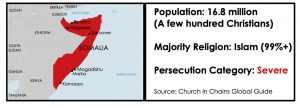
Somalia has suffered civil war, military coups, Islamist terrorism, drought and corruption, leaving many dependent on food aid. The Islamist terrorist group al-Shabaab (see below) controls much of south and central Somalia and has declared its aim to eradicate Christianity, which it regards as foreign. According to the constitution Islam is the state religion and laws must comply with Sharia principles.
Somalia was formed in 1960 after gaining independence from Britain and Italy. It suffered years of drought, famine, fighting and anarchy and was without a formal government for over twenty years after President Siad Barre was overthrown in 1991. His overthrow led to civil war, as guerrilla groups and militias based on traditional ethnic and clan loyalties fought for power.
Several attempts to form new governments since 1991 failed due to the rise of Islamic insurgent groups, of which al-Shabaab is the most dangerous. In 2000, a Transitional Federal Government (TFG) was set up, but in the years that followed Islamist groups took control of some areas, including the capital, Mogadishu. Islamists and warlords fought with each other and with the TFG, but eventually Ethiopian, TFG and African Union forces expelled the militants from Mogadishu. More than 10,000 civilians were killed and approximately one million people were displaced in the insurgency.
In 2012 a new parliament was sworn in and Hassan Sheikh Mohammad, an academic and civil activist, was chosen as president. In 2017 he was succeed by former prime minister Mohamed Abdullahi Mohamed, but Hassan Sheikh Mohammad was re-elected in 2022.
Christians in Somalia
All church buildings were destroyed in the civil war that began in 1991 and the church was driven underground. Many Christians fled the country and the few who remain, almost all converts from Islam, can only meet in strict secrecy for fear that their neighbours will betray them to al-Shabaab. It is illegal to become a Christian, to possess a Bible or to propagate any religion other than Islam.
The pervasive belief that to be Somali is to be Muslim means conversion to Christianity is seen as a betrayal of tribe and nation. Many converts have been murdered – often by beheading – by family or community, and since al-Shabaab terrorists seized control of central and southern Somalia in 2008 they have murdered dozens of Christians. Attacks have also been carried out on workers from Western aid agencies that al-Shabaab perceives to be Christian and most agencies have withdrawn from Somalia.
Some young male converts are sent away by their families to be trained as al-Shabaab fighters and female converts are often forced to marry radical sheikhs. Many young Somalis are disillusioned by the violence they see being perpetrated by radical groups in the name of Islam.
Even in government-controlled areas, it is considered socially unacceptable to be a Christian, and it is also difficult to be a Christian in Somaliland and Puntland, semi-autonomous regions in the north that enjoy relative stability – several Christians have been imprisoned in Somaliland.
Al-Shabaab
The terrorist organisation al-Shabaab, which declared allegiance to al-Qaeda in 2012, is the main Islamist organisation operating in Somalia and is estimated to have between 7,000 and 9,000 fighters. Its name means “The Youth” in Arabic. Al-Shabaab rules according to a strict interpretation of Islamic laws known as Wahhabism (the same form of Islamic rule imposed in Saudi Arabia and Afghanistan). This form of Islam is so extreme that even Sufi Muslims have been driven underground. All laws come from Sharia law and punishments include flogging, hand amputation and execution by stoning.
In recent years, al-Shabaab has spread to northeast Kenya. In 2011, Kenyan troops entered Somalia in pursuit of al-Shabaab, which the Kenyan government accused of kidnappings and murders in Kenya, and Al-Shabaab leaders warned of reprisals. Many members of al-Shabaab who have been driven out of Somalia have taken refuge in northeast Kenya, where they have carried out many attacks, including the attack on Nairobi’s Westgate Shopping Mall in 2013.
(Barnabas Aid, BBC, International Christian Concern, Mission Network News, Open Doors World Watch List, Operation World, Voice of the Martyrs Canada)
